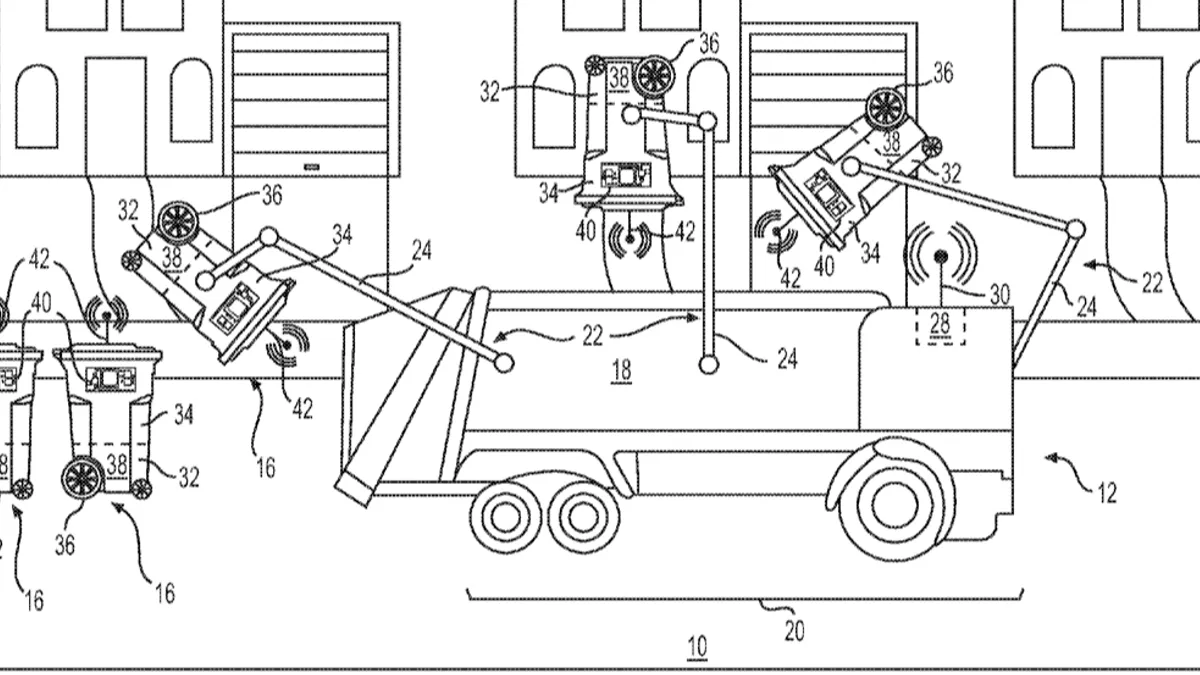Dive Brief:
- Rubicon Global has received patent approval for a "method, system, and vehicle for autonomous waste removal," as first reported by the Atlanta Business Chronicle. The patent, filed by CTO Philip Rodoni in Aug. 2016, was approved in Nov. 2017.
- The patent describes the current system of house-to-house collection as inefficient, in part because residents may forget to set out their carts or often leave them at the curb for too long after service. Rubicon proposes potential scenarios in which an automated vehicle drives down a street and sends a signal to a "plurality of transporters," which would then autonomously bring receptacles out for collection.
- Service vehicle types could vary and the transporters could have wheels or tracks. Transmitters could use a variety of communication methods, including Bluetooth, RFID, cellular, radio, satellite or other wireless connections. Planned applications aren't immediately clear. Rubicon declined to comment.
Dive Insight:
Rubicon Global has been something of an enigma ever since it launched, describing itself as a technology company while competitors deride it as a broker. This has led to ongoing legal action and plenty of public posturing from all sides. Yet this patent, and multiple others in various stages of approval, make it clear that the Atlanta-based company may have bigger plans than many realize.
Patent activity over the past two years shows Rubicon continues to work on updating its proprietary routing and service confirmation technology, along with new plans for sensors in commercial containers. The patents also show a broader focus on residential collection. This ranges from relatively small designs such as carts with false bottoms, to a consumption-based service prediction system to a system for more efficiently managing collection routes within a given subdivision or neighborhood.
As described in the autonomous collection patent, some of these applications could also work in commercial settings. The majority of Rubicon's business still lies in the commercial sector, with a growing focus on small business clients, but the company has been making moves on the municipal side too.
Last year, the company announced pilots in Santa Fe, Atlanta and Columbus, GA that brought its technology into residential collection fleets to help with routing and contamination tracking. At various 2017 industry events, Rubicon executives repeatedly staked their claim on the "smart cities" trend and said the potential for data collection and other services was "nearly limitless."
The question now is how these futuristic ideas translate into revenue — and where Rubicon could pilot them. Waste industry executives are often quick to say autonomous collection is years or decades away. However, Waste Management, which recently promoted its first "chief digital officer," will be testing autonomous vehicles on closed sites in the coming year.
One of the most tangible example of autonomous collection is currently being tested by Volvo and service provider Renova in Sweden. The country is known for its innovation in this area, and willingness to explore new technologies without fear of job loss because it has strong social safety net programs. This particular Volvo pilot involved a human walking alongside the truck to collect material. Though Swedish students from multiple universities have previously partnered with Volvo and Renova to also test robotic collection. That project was cited as a reference by the patent examiner for Rubicon's own concept.
Rubicon has previously hinted that new municipal partnerships are in the works, and CEO Nate Morris has discussed the potential of driverless vehicles in the past, so more details may be forthcoming this year. Whatever the company announces in this area will likely have to start small due to technological and regulatory factors. Though either way, the implications of Rubicon getting more involved in the residential sector are significant.













